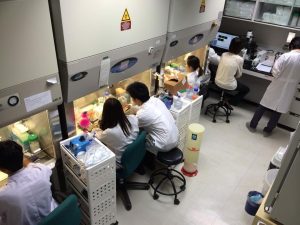Lead Investigators: Dr Peera Jaru-Ampornpan, Dr Stefanie Frank, Prof. Anan Jongkaewwattana
Recently, swine farming industry in Thailand and the neighboring Southeast Asian countries has faced waves of recurrent and emerging viral attacks. Farmers combat these viruses with vaccination but most vaccines must be imported at high cost. Critically, many vaccines are ineffective due to mismatches between the imported vaccine and the local circulating strain. There is a clear need to create better vaccines that are matched to local markets.

Recombinant subunit technologies will be used to achieve this goal as: (i), subunit vaccines can induce neutralizing antibody production and strong protective immunity against some pathogens; (ii), they can effectively be used as booster vaccines to complement or enhance live-attenuated or killed vaccines; (iii), once an efficient platform for recombinant protein production is established, it will be cost-effective and straightforward to produce a matching antigen for the currently circulating virus strains for maximum protection. Finally, recombinant expression can reach high protein expression levels, which significantly reducing the vaccine cost per dose.
In this project, we plan to apply recombinant protein technology to produce antigens to two of the most devastating and prevalent swine viruses in Thailand. The first focus is on porcine circovirus (PCV). The current subunit vaccines agains PCV2 are 100% imported (GBP 10.5M values in 2013). We would like to lift the economic burden from the farmers by providing cheaper but equally (or more) effective vaccines that match the local currently-circulating strains of PCV2 in combination with the newly-discovered PCV3. Following the success of the PCV vaccine, we plan to produce a spike protein from porcine epidemic diarrhea virus (PEDV) and test its properties in inducing neutralizing antibodies. If successful, it will provide an alternative to using live-attenuated vaccines which are not very effective at the moment.
